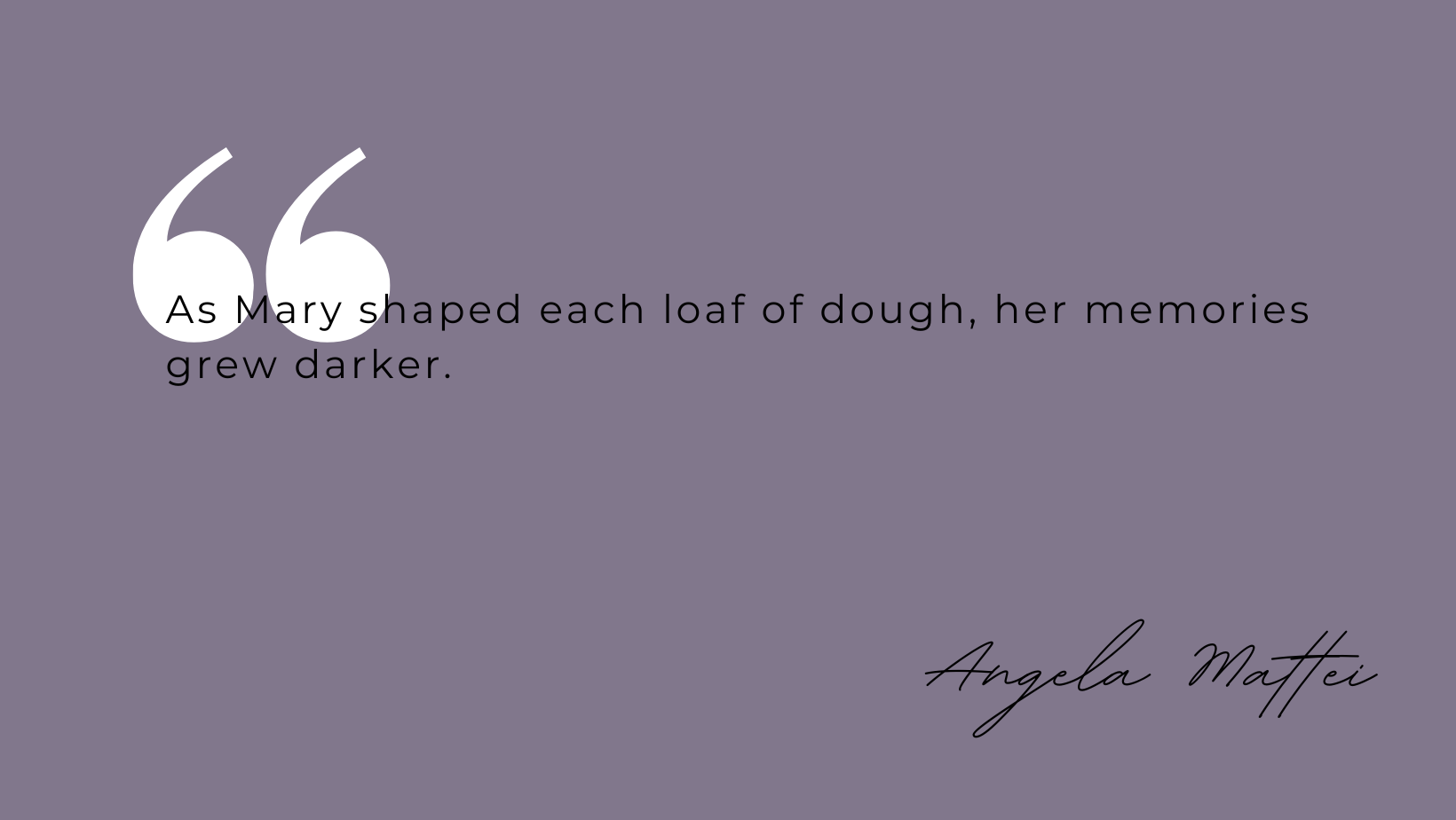Angela Mattei
Mary saw the particles of flour in the air as they danced gently inside a ray of sun. Nine, ten, eleven … She was counting handfuls of the stuff as she dumped it into a bowl. It was soft, coating the lines and grooves of her fingertips. Making bread. She had done this for as long as she could remember. Like sleeping and washing and recalling stories from the Torah—mixing and shaping and cooking and eating bread were familiar to her.
This time was different though. Maybe it was age catching up to her. Or the ache in her right hip that made her move just a bit more slowly today. But this time she lingered over the mixture of flour and salt and oil just a bit longer giving space to thought.
“And a sword will pierce your own soul too.” Simeon’s eyes had been so dark and soft and sorrowful when he had whispered that—nearly forty years ago now. The scars in her heart throbbed with the memory. She was a new mom then—barely even married—still healing from birth and travel and separation from her own mother. This child. He was a gift—a blessing. That God had mighty intentions for Him—that she knew. But she could only anticipate pride and joy and fulfillment. Where did grief fit in?
She couldn’t have known that the death of all the innocent babies and toddlers at the command of Herod, was a foreshadowing of her own grief to come. All of them taken in the search for her own. The death of those sweet babies was sorrow enough, wasn’t it? But she ran. And hid. And her sweet little boy was spared. But at the cost of so many lives. Young Mary’s eyes burned with a thousand tears for all those mothers with gaping holes in their souls. And all she could do was hide her son and make bread and pray and cry.
Mary took the dough from the bowl and put it on the flour-dusted table. She began to press with her hands and fold it over and press and fold. A tear dropped, unnoticed, and Mary’s hands just kept working. She replayed in her mind the time she thought she had lost him entirely when they had visited the temple. A day-long walk back to the town they were last in, and three full days spent looking for him, fretting if Jesus would still be where they’d last seen him. But when they found him in the temple, engaging with the teachers there, Mary caught a glimpse of the man Jesus had become. Belief gathered up her anxious thoughts, and she gave pause to savor the newness of her son and how she now saw him.
As Jesus moved into his earthly life’s work, Mary saw him less as he related to her, and more as he related to the world around him. She missed his physical presence at home, chatting while he watched her bread making rituals. But the way he loved their people; the way he talked to strangers; the way he saw—truly saw—the unseen. Even now, years later, Mary’s heart ached in a way that only a mother’s can. Her capacity to love and to be loved grew as she released her son to be the Son of God.
As Mary shaped each loaf of dough, her memories grew darker. Dark with sweat and wailing and jolted shoving. She was watching her son carry his splintered cross—as bloody as the night he was born—stumbling and breathing and keenly aware. “Why?” screamed her hands. “Why?” screamed her teeth. “Why?” screamed her stomach. “I don’t know why. Or how. Or when. But this must end in goodness,” choked her heart.
Her sweet son was driven through the flesh with nails. He was elevated to be mocked. A mother is created to do anything to protect her child. And yet, the goodness of her son sought to protect his mother by pairing her with his dearest and closest friend—uniting them as a new family. And Mary stood by this gift and watched her boy leave her and her tears carried with them all the words her heart struggled to find.
They brought the cross down—his body bouncing with the thud. His face—once etched with expressions so complex you could never know the expanse of thought and feeling behind them—now lay flat and cold and unmoving. “And a sword will pierce your own soul too.” Simeon’s words whispered in her heart. And like a threaded needle, she pulled on that cord of words until she found more woven throughout her very being. “Salvation.” “Light for revelation … and glory.” “This child is appointed.”
Sliding the bread into the hot oven, Mary felt the finality of seeing her son laid to rest in a dark, cold tomb so many years back. Death. She couldn’t know the depths of his death, if she hadn’t known the goodness of his life. And she couldn’t know the goodness of his life, without knowing the depths
of his death.
Later that evening, Mary gathered with brothers and sisters and handed over the loaves she had baked. She greeted each friend, passing peace between them with a kiss on their cheek, and a twinkle in her eye. When the last person had arrived, they all quieted down and turned to face the host. “This is my body, broken for you.”



